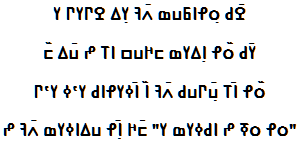Mandingo love poem
ߘߎߥߊߟߋ߲
ߌ ߣߌߣߐ ߡߌ߲ ߓߍ߫ ߘߎߥߊߟߋ߲ ߕߐ߫
ߏ߬ ߡߎ߫ ߒ ߠߊ ߛߎߞߏ ߘߌߡߊ߲ ߟߋ߬ ߕߌ߫
ߣߴߌ ߦߴߌ ߕߊߟߌߦߊ߫ ߊ߬ ߓߍ߫ ߕߎߣߎ߲߫ ߠߊ߫ ߟߋ߬
ߒ ߓߍ߫ ߘߌߦߊߡߎ ߟߊ߲߫ ߞߏ߫ "ߌ ߘߌߦߕߊ ߒ ߧߋ ߟߋ"

Romanization
Dúwálen
í nínɔ́` mín` bɛ́ dúwálén` tɔ́
ò mú Ń ná` súkó` dímán` lè tí
n'í y'í tálíyá à bɛ́ túnún ná lè
Ń bɛ́ díyámú` lán kó "í díyátá` Ń ɲé` le"

→ French poem ←
Mandingo language
Mandingo love poem (Mandinka , Mandinga, Mandé, Socé, Mandingo, Mande, Mandinque, Manding), a translation for a Mande poem from West Africa, Guinea Bissau, Guinea, Gambia, Senegal (Middle Casamance).
Mandinka is the Mande language which is spoken in a region which corresponds to what was the ancient kingdom of Kaabu (Kaabunké), and which spanned parts of the countries previously mentioned.
The Mandingo (name which corresponds to the English name), on all this territory has variations of course but not too many; on the other hand it differs well from other Mandingo languages.
The Mande languages like Mandingo, are languages arrived in a region where Atlantic languages were spoken; the latter saw their speakers being displaced or mingling with the newcomers, with the result of the creation of new idioms.
The Mandingo, which is a Nigerian Congolese language, has 1.5 million speakers, and is an official language in Senegal.
This pretty alphabet n'ko, concocted by Souleymane Kante for the Mandingo languages, has 20 consonants and 7 vowels.
Among themselves, the Mandingo speakers refer themselves as the Mandiŋkóolu, (Mandiŋkôo, Mandiŋkakáŋo).
Senegal and Mande people
The country is one of the most developed in black Africa. After the groundnut it is: phosphate mining, millet growing and tourism, which thrive!
Millennia ago, the Mandes formed the nucleus of West African civilizations, with agriculture and iron, and then spread to many countries.
Their movements from the interior to the Atlantic coast were first carried out in the 1st millennium by traders, religious and for ironworking. Then, between the thirteenth and sixteenth century, it will be more travel related to military conquests associated with the history of the empire of Mali.
They are classically divided into two large families: the Southern Mandes and the Mandingoes. The former are the oldest and occupy the fringes of the forest; The latter occupy savannah zones and are from the great empires of the Niger valley after the 10th century.
The Malinke-Bambara-dioula-mandigo ensemble, conventionally called Mandingo, is thus linked to the medieval empire of Mali.